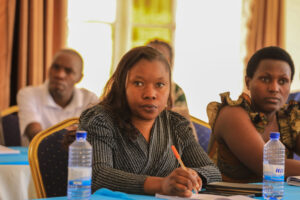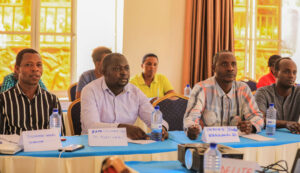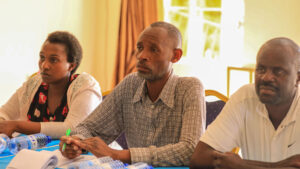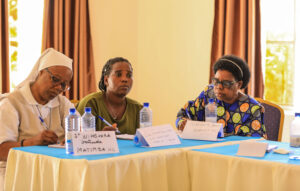Close to three decades after the Genocide against the Tutsi in Rwanda, Rwandans are still experiencing its effects on mental health, socio-economic development, social cohesion, and reconciliation. The recent Rwanda Mental Health Survey conducted in 2018 by the Rwanda Biomedical Centre (RBC) revealed that the prevalence of mental health disorders among the Rwandan population is higher than the global average and is particularly elevated among genocide survivors. Interpeace’s recent research studies corroborated the findings of the 2018 national survey. The most commonly diagnosed mental illnesses are major depression, post-stress traumatic disorder, anxiety, panic disorder, substance dependency, and social phobia. To address these longstanding consequences, strengthening and supporting the decentralisation of the National Mental Health and Psycho-social Support System is of paramount importance.
Over the past 20 years, the Government of Rwanda has made significant efforts to decentralise mental healthcare in referral and district hospitals and integrate it into primary healthcare (health centers) across the country. However, the country still faces challenges such as the scale of mental health needs that outstrips the capacity of available professionals, low awareness and knowledge of mental health issues, poor mental health infrastructure, and low utilisation of mental health services, which stands at 5.3%.
Through its societal healing programme implemented with the financial support of the Government of Sweden, Interpeace works with the Ministry of Health through the Rwanda Biomedical Centre (RBC) to find innovative solutions to those challenges. The programme strengthens the capacity of mental health professionals through training and the provision of equipment. With its partners such as Prison Fellowship Rwanda, Haguruka, Dignity in Detention (DIDE) Rwanda, and Groupe des Anciens Etudiants Rescapees du Genocide (GAERG), Interpeace has also introduced a community-based healing approach known as the Resilience-oriented therapy protocol, a multi-phase group-based treatment for emotional regulation, behavioural self-management, and identity development to complement the one-on-one approach usually used in health facilities across the country.
In July 2023, Interpeace trained 58 clinical psychologists and mental health nurses from seven district hospitals, 32 health centres, and four correctional facilities from the five districts of programme intervention, namely Musanze, Nyabihu, Nyamagabe, Nyagatare and Ngoma, to implement resilience-oriented therapy at health centre level.
Clementine Sezicyeye, a Mental Health Nurse at Kigeme Hospital, located in Nyamagabe District, Southern Rwanda, is among the trainees. Her unit receives over 200 cases of various mental health disorders every month. She mainly offers medication-assisted treatment. She is convinced that the community-based Resilience-oriented healing spaces will contribute to ensuring easy access to mental health care for more people.
“The one-on-one approach we have been using is good and effective, but it is not enabling us to help as many people as the scale of needs requires. We have learnt a new group-based approach that allows us to help many people at the same time with the possibility for facilitating more than two groups a week. This is an innovative solution to this challenge. We are ready to implement this protocol,” commented Sezicyeye.
The trained health professionals will facilitate resilience-oriented healing spaces created in their health centres, accommodating a group of 10 people each. Group members attend healing dialogues for a period of 30 weeks, composed of 24 weekly healing sessions and six follow-up sessions. Community members are allocated to appropriate healing groups after screening sessions conducted in communities to assess the level of their psychological distress and their needs.
The programme has supported health centres and hospitals with tablet computers for adequate data collection and management during the screening and healing processes. They will also be provided with motorcycles to facilitate the transportation of mental health professionals to remote communities.
“There are many people in communities who don’t even know or recognise that they have mental health issues and those who know but have limited means to access health care. As a health centre, we have a very limited budget to organise large-scale activities in communities. I believe that enabling us to reach out to them is the best way to support them,” said Emmanuel Mbarushimana, the Head of Muhoza Health Centre, located in Musanze District, Northern Province of Rwanda, who added that community screening sessions will be an opportunity to carry out awareness campaigns to increase awareness and knowledge among the community members as well as combat the stigma that people with mental health issues usually face.
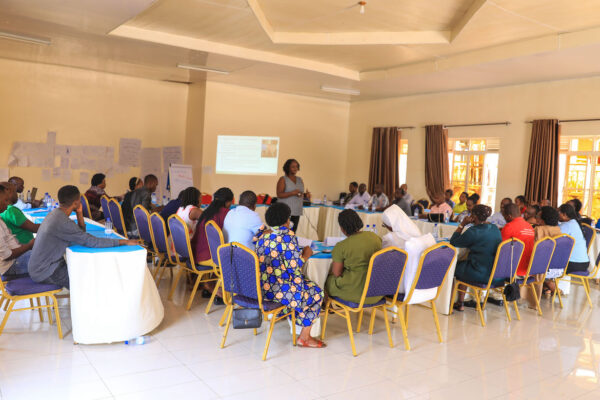

The low mental health literacy among heads of health centres still constitutes a stumbling block to service delivery. All 32 heads of health centres from five districts of the programme have been trained to increase their knowledge and strengthen their capacity in mental health and psycho-social support care. “My colleagues and I used to undervalue the work of psychologists and mental health nurses because we had little knowledge of what they do and what it requires. We often used them as backup staff when we faced staff shortages. Now I have understood that they do a lot of work and need more time and safe space,” stated Mbarushimana.
The three-day Africa Resilience Forum 2023, titled “Financing Security, Peace and Development for a Resilient Africa” and organised by the African Development Bank, started in Abidjan, Cote d’Ivoire, yesterday. Interpeace and its Finance for Peace initiative were featured prominently as one of the key partners of this milestone event. Peace Finance, an approach developed by the Finance for Peace initiative, was highlighted as a solution to the vicious cycle of conflict and underdevelopment.
A video by Finance for Peace to showcase Peace Finance was shown as part of the opening of the forum, helping to frame the event. The video was filmed as part of the joint research project by Finance for Peace and the African Development Bank in Mozambique.
Elhadj As Sy, Member of the Governing Board of Interpeace, was invited to speak on the opening panel titled “The Case for Peace-Positive Approaches that link Humanitarian, Development, Peace and Security Need”. He spoke passionately, outlining the importance of the peace, development and humanitarian nexus in providing sustainable approaches.
He said: “The key word is trust, between communities and governments. If that trust is broken, people remember. Any actors need to consider this question: Are we contributing to the problem, or are we solving it. We need to be building resilience of communities, building the path of a sustainable peace.”
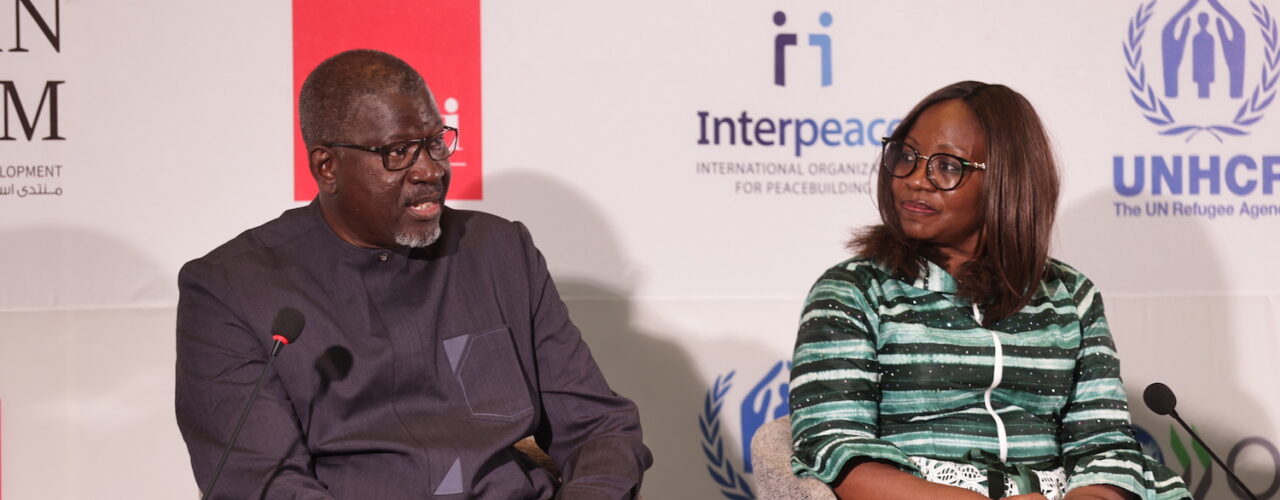

Other speakers on the opening panel, jointly developed with Aswan Forum, included African Development Bank’s Vice President for Regional Development, Integration and Delivery Marie-Laure Akin-Olugbade; Gilles Carbonnier, Vice President, International Committee of the Red Cross; and Noura Hamladji, Deputy Assistant Administrator and Deputy Regional Director, Regional Bureau for Africa. The discussion on innovative financing solutions to advance peace was moderated by Ahmed Abdel-Latif, Director General, Cairo International Center for Conflict Resolution, Peacekeeping and Peacebuilding (CCCPA).
Sitting next to As Sy, VP Marie-Laure Akin-Olugbade of the African Development Bank said: “In order to deliver on the Peace Finance agenda, we need to build innovative partnerships. We cannot pretend to be able to do everything alone, but we can work together.”
“We particularly like all the work Interpeace is doing on Peace Finance, and there is a lot of potential there.”
Ambassador Deike Potzel, Director General for Crisis Prevention, Stabilisation, Peacebuilding and Humanitarian Assistance, Federal Republic of Germany, also attended the Africa Resilience Forum. Witnessing the signing of the memorandum of understanding between Interpeace and the AfDB, she said:
“I am so delighted to have witnessed the signing of the MoU between AfDB and Interpeace, to address the issues we are talking about today. This is about making the systems fit for purpose and shrinking the needs.”
“We are also listening to the UN Secretary-General who has called for sustainable fnancing for peace, which is also a part of the New Agenda for Peace. We need to unlock the different sources of funding including the private sector, DFIs and IFIs.”
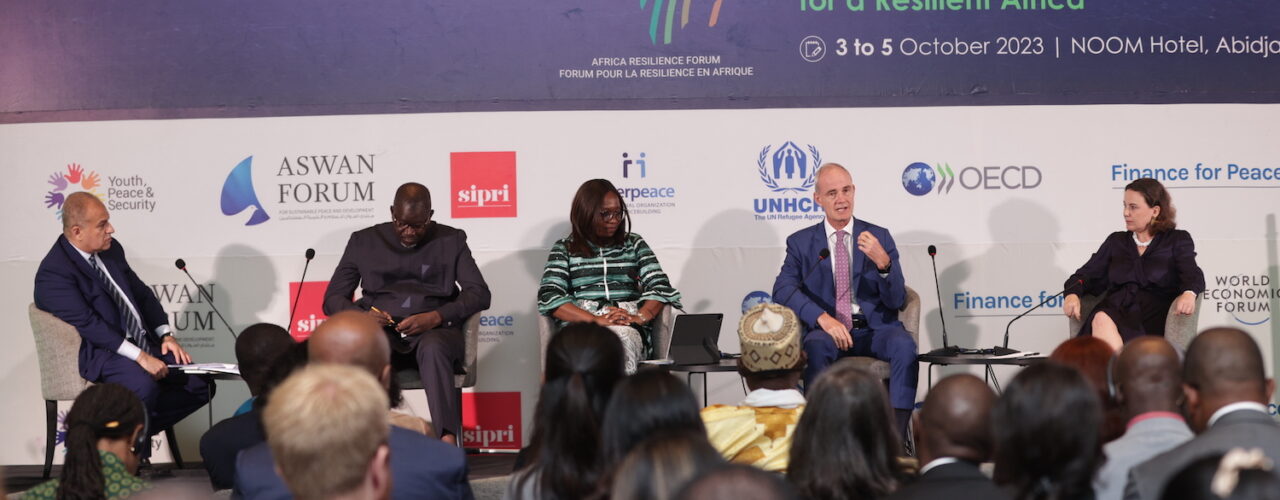

Ambassador Potzel added: “This is what we are passionate about. We want to make this happen. I want to thank the AfDB for picking up the baton, and I also want to thank Interpeace for working on standards for peace, which is most important. The blended financing might help business not to shy away from the fragile contexts. This is where the future is.”
The 5th Africa Resilience Forum continues until Thursday when Interpeace’s Finance for Peace initiative hosts two panel discussions titled creating the structures and environment for Peace-positive finance and call for action on innovative peace positive private investments.
The African Development Bank and Interpeace, an international organisation for peacebuilding based in Switzerland, today signed a memorandum of understanding to jointly promote economic investment and social development that positively impacts peace.
The memorandum is accompanied by a practical work plan with goals and outcome targets, underscoring the innovative partnership between the Bank and the Finance for Peace initiative by Interpeace.
The signing ceremony took place during the Africa Resilience Forum currently underway in Abidjan, Côte d’Ivoire. The MoU was signed by the Bank’s Vice-President for Regional Development, Integration and Business Delivery Marie-Laure Akin-Olugbade, and a member of Interpeace’s governing board Elhadj As Sy.
Ambassador Deike Potzel, Director General for Crisis Prevention, Stabilisation, Peacebuilding and Humanitarian Assistance at the German Federal Foreign Office, which supports Interpeace’s Finance for Peace initiative, attended the signing.
Akin-Olugbade highlighted the importance of pursuing innovative approaches to support peace and security on the continent.
“The African Development Bank is pioneering these efforts through the Security-Indexed Investment Bond (SIIB) Initiative, endorsed at the AU Heads of State Summit in February 2022”, she told participants, adding that the proposed bonds aim to raise additional financing at scale, including through capital markets, to mitigate structural drivers of violence and conflict. The initiative also aims to offset the fiscal implications of elevated security sector spending.
“The Finance for Peace initiative by Interpeace, supported by Germany, complements the Bank’s own efforts in this space, as it aims to develop protocols and pilots around peace finance, including for a peace bond asset class”, Akin-Olugbade said.
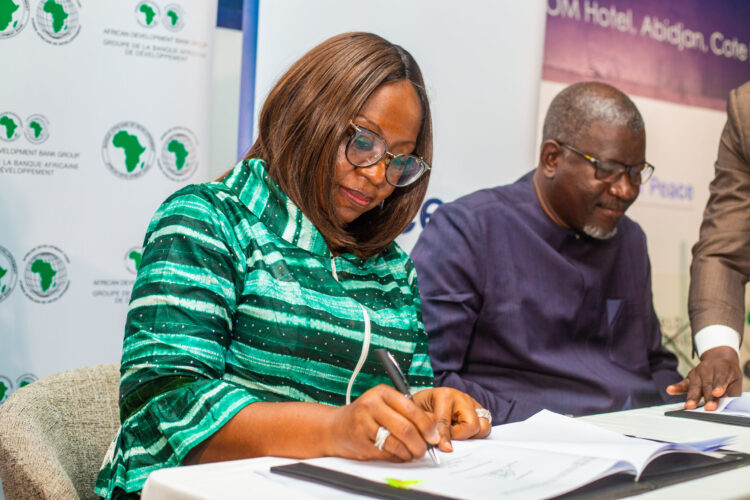
AfDB Vice President Marie-Laure Akin-Olugbade, Member of Interpeace Governing Board Elhadj As Sy.
Photo credits: AfDB
Elhadj As Sy said: “Interpeace is delighted to formalise the partnership with the African Development Bank. “This strong collaboration between the AfDB and Interpeace affirms our joint commitment to catalyse private and public capital to work for a more inclusive, equitable and peaceful world”, he said.
“This partnership will demonstrate to the wider multilateral and international development financing system the need, benefits, potential and practicality of Peace Finance approaches on the continent and beyond. It will grow Peace Finance as a thematic investing approach, by developing early and successful pipeline development of Peace Finance and by fostering on-the-ground networks and capacities in Peace Finance in Africa.”
The areas for collaboration outlined by the Memorandum of Understanding, in accordance with the parties’ mandates, include:
- Technical and capacity strengthening for embedding Peace Finance approaches that realise peace impact into AfDB’s sovereign and non-sovereign operations and policy dialogue.
- Advisory support and collaboration to develop a pipeline of Peace Finance structures that realise peace impacts.
- Multistakeholder engagement and field building for wider political and investor support for Peace Finance.
As part of the partnership, a joint research project on peace-positive investment opportunities in Mozambique was launched by the two organisations recently.
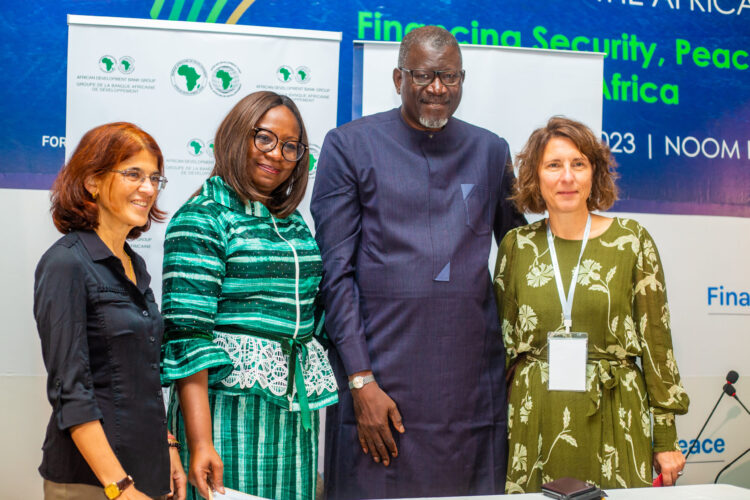
Rosy Khanna, Executive Director, Finance for Peace, initiative by Interpeace, AfDB Vice President Marie-Laure Akin-Olugbade, Member of Interpeace Governing Board Elhadj As Sy, Ambassador Deike Potzel, Director General for Crisis Prevention, Stabilisation, Peacebuilding and Humanitarian Assistance, German Federal Foreign Office.
Photo credits: AfDB
Abidjan, 3 October 2023 - The African Development Bank and Interpeace, an international organisation for peacebuilding based in Switzerland, today signed a memorandum of understanding to jointly promote economic investment and social development that positively impacts peace.
The memorandum is accompanied by a practical work plan with goals and outcome targets, underscoring the innovative partnership between the Bank and the Finance for Peace initiative by Interpeace.
The signing ceremony took place during the Africa Resilience Forum currently underway in Abidjan, Côte d’Ivoire. The MoU was signed by the Bank’s Vice-President for Regional Development, Integration and Business Delivery Marie-Laure Akin-Olugbade, and a member of Interpeace’s governing board Elhadj As Sy.
Ambassador Deike Potzel, Director General for Crisis Prevention, Stabilisation, Peacebuilding and Humanitarian Assistance at the German Federal Foreign Office, which supports Interpeace’s Finance for Peace initiative, attended the signing.
Akin-Olugbade highlighted the importance of pursuing innovative approaches to support peace and security on the continent.
“The African Development Bank is pioneering these efforts through the Security-Indexed Investment Bond (SIIB) Initiative, endorsed at the AU Heads of State Summit in February 2022”, she told participants, adding that the proposed bonds aim to raise additional financing at scale, including through capital markets, to mitigate structural drivers of violence and conflict. The initiative also aims to offset the fiscal implications of elevated security sector spending.
“The Finance for Peace initiative by Interpeace, supported by Germany, complements the Bank’s own efforts in this space, as it aims to develop protocols and pilots around peace finance, including for a peace bond asset class”, Akin-Olugbade said.
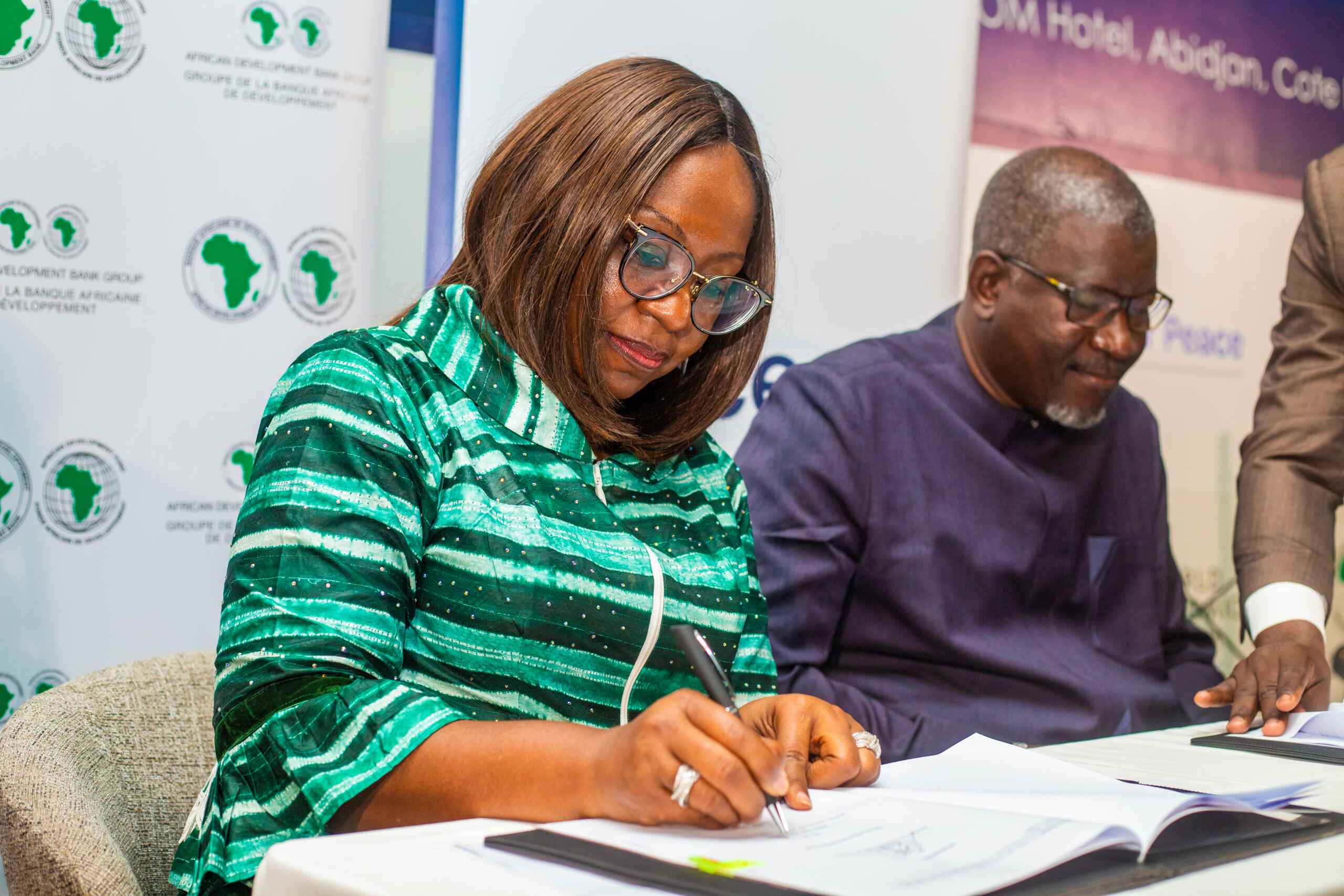
Photo credits: AfDB
Elhadj As Sy said: “Interpeace is delighted to formalise the partnership with the African Development Bank. “This strong collaboration between the AfDB and Interpeace affirms our joint commitment to catalyse private and public capital to work for a more inclusive, equitable and peaceful world”, he said.
“This partnership will demonstrate to the wider multilateral and international development financing system the need, benefits, potential and practicality of Peace Finance approaches on the continent and beyond. It will grow Peace Finance as a thematic investing approach, by developing early and successful pipeline development of Peace Finance and by fostering on-the-ground networks and capacities in Peace Finance in Africa.”
The areas for collaboration outlined by the Memorandum of Understanding, in accordance with the parties’ mandates, include:
- Technical and capacity strengthening for embedding Peace Finance approaches that realise peace impact into AfDB’s sovereign and non-sovereign operations and policy dialogue.
- Advisory support and collaboration to develop a pipeline of Peace Finance structures that realise peace impacts.
- Multistakeholder engagement and field building for wider political and investor support for Peace Finance.
As part of the partnership, a joint research project on peace-positive investment opportunities in Mozambique was launched by the two organisations recently.
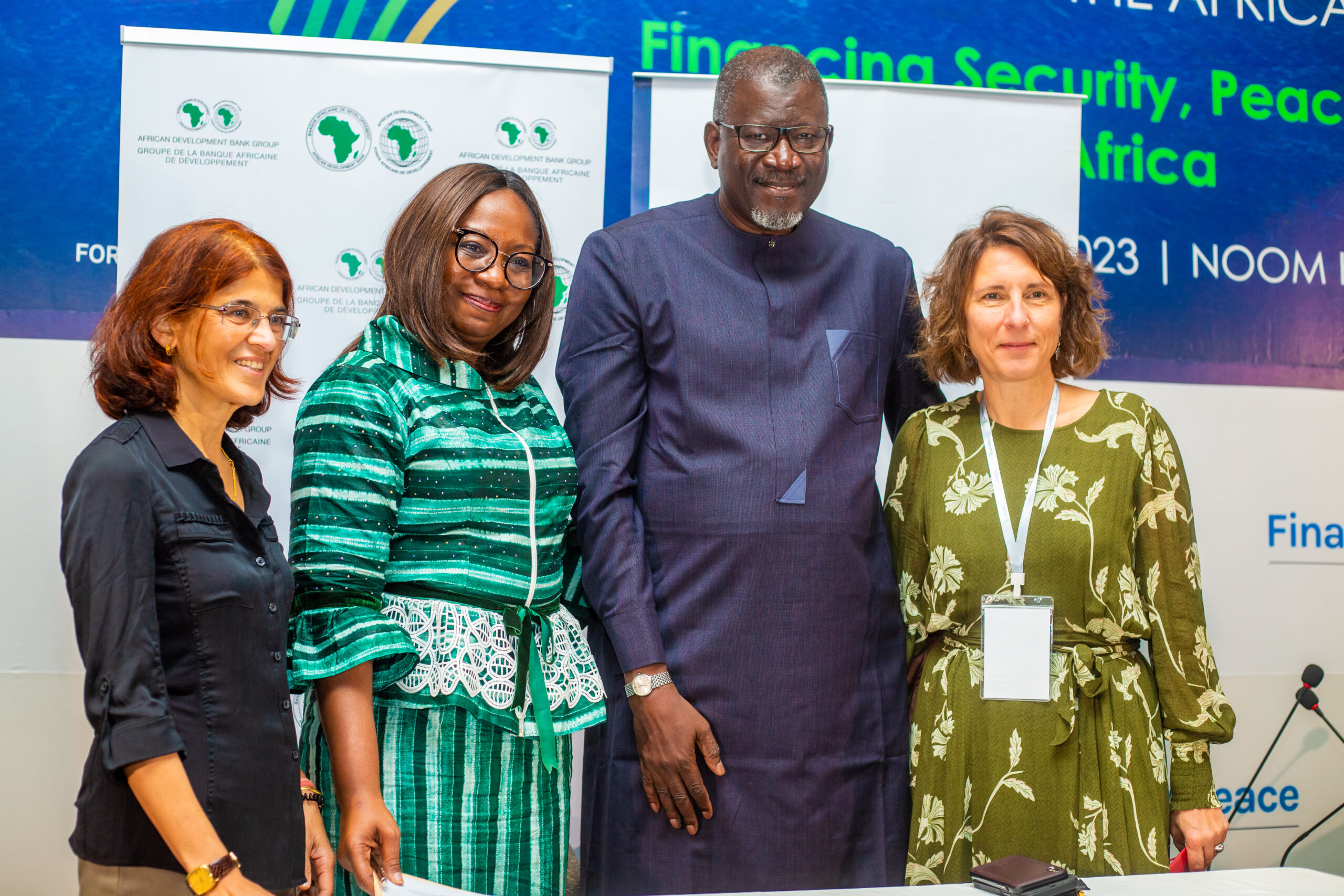
Photo credits: AfDB
Geneva-based international peacebuilding organisation Interpeace has a new president as of Monday, October 2, 2023. Itonde Kakoma is a deeply experienced practitioner in peace mediation, conflict resolution and humanitarian diplomacy. He joins Interpeace from an appointment as Permanent Representative of the International Federation of Red Cross and Red Crescent Societies (IFRC) to the African Union, having had roles earlier with CMI -- Martti Ahtisaari Peace Foundation, including as its Director for Global Strategy, and with the Carter Center in its Conflict Resolution Program. Kakoma has also been a Global Fellow and Executive in Residence at the Geneva Centre for Security Policy. Itonde Kakoma is a first generation American of East African descent.
“Itonde Kakoma is uniquely qualified and an exceptional leader. Interpeace’s Governing Board recognises the need to adapt peacebuilding to the rapidly changing global context of peace and security, and to bring on board a new leader for a new and challenging future. With Itonde’s experience and knowledge of peacebuilding policy and its practical application, I am confident that we have a new President for the future, who will take forward Interpeace and advance peacebuilding globally,” said Amre Moussa, Chair of the Interpeace Governing Board.
The Governing Board, with support from an international recruitment firm, Perrett Laver, led the nine-month global search to appoint Interpeace’s new President.
The early focus of Kakoma’s Presidency is expected to be on leading wide-ranging listening exercises and consultations on adaptations to the organisation’s current five-year Strategy, A Resilient Peace, and on building a forward-looking pathway for Interpeace from the foundation of its 30th anniversary in 2024. “Rooted in national ownership with an aim to influence global decision making fora, I am persuaded that Interpeace’s organisational vision and mandate are ever more relevant for addressing the multifaceted challenges of our world today and for the future of peacemaking” Kakoma said.
Interpeace is a strategic partner of the United Nations, with a representative of the UN Secretary-General serving on its Governing Board. The organisation has therefore been active in advancing the United Nations Sustainable Development Goals, and on strengthening linkages and creating greater impact and efficiency between peace, development and humanitarian actors. It is expected that Itonde Kakoma will also be focussed early in his term on key UN global processes including the contribution of Interpeace to the UN Summit of the Future in 2024 and the Review of the UN Peacebuilding Architecture in 2025.
“We know that no organisation can single-handedly tackle today’s deeply globalised peace and security challenges and the ways in which they manifest themselves in local communities worldwide. Partnerships between governments and organisations are crucial and these must be accountable to the people they serve. The international community, including humanitarian, development and peace actors, have a responsibility to rethink current approaches and utilise our collective assets,” Kakoma said.
As an international peacebuilding organisation, Interpeace has been at the forefront of creating practical local leadership, design and ownership of conflict resolution processes. Itonde Kakoma is therefore already planning to visit some of the countries where Interpeace is supporting local communities and national governments, beginning in the Horn of Africa and the Sahel regions.
“I am thrilled to be joining Interpeace, where the principles of empowering communities towards national ownership to ensure effective solutions to conflict and crisis is more than just a belief acquired over time – it is part of the organisation’s core identity.”
“We must make a reality of global commitments to women and youth, especially in peace and security but moving from norms to agency and impact. When women and young people are involved in decision-making, outcomes are better quality and more durable for entire communities,” Kakoma added.
“Interpeace is marking 30 years of experience in accompanying states and communities to resolve conflict, build trust, and strengthen social cohesion. It has an equally long history of challenging established concepts in peace-making and developing new methods in service of the international community. Recent work to rethink overly-militarised stabilisation missions and to create new sources of finance for peace are examples of the global public goods that I look forward to supporting to create in the years ahead,” Kakoma said.
For questions or interview requests, please contact Interpeace head of Communications, Luvini Ranasinghe, ranasinghe@interpeace.org /tel. +41 79 475 64 95.
Interpeace
Interpeace is an international organization for peacebuilding. With almost 30 years of experience, it has implemented a broad range of peacebuilding programmes in Africa, the Middle East, Asia, Europe, and Latin America. Interpeace tailors its approach to each society and ensures that its work is locally designed and driven. Interpeace also assists the international community – especially the United Nations – to play a more effective role in peacebuilding, based on Interpeace’s expertise in field-based work at grassroots level. Interpeace is headquartered in Geneva, Switzerland, and has offices around the world. For more information, please visit our website: www.interpeace.org
On Monday, 2 October 2023, a new President took the helm at Interpeace.
Itonde Kakoma is a deeply experienced practitioner in peace mediation, conflict resolution and humanitarian diplomacy. He joins Interpeace from an appointment as Permanent Representative of the International Federation of Red Cross and Red Crescent Societies (IFRC) to the African Union, having had roles earlier with CMI -- Martti Ahtisaari Peace Foundation, including as its Director for Global Strategy, and with the Carter Center in its Conflict Resolution Program. He has also been an Executive in Residence and Global Fellow at the Geneva Centre for Security Policy. Itonde Kakoma is a first generation American of East African descent.
“Itonde Kakoma is uniquely qualified and an exceptional leader. Interpeace’s Governing Board recognises the need to adapt peacebuilding to the rapidly changing global context of peace and security, and to bring on board a new leader for a new and challenging future. With Itonde’s experience and knowledge of peacebuilding policy and its practical application, I am confident that we have a new President for the future, who will take forward Interpeace and advance peacebuilding globally,” said Amre Moussa, Chair of the Interpeace Governing Board.
The Governing Board, with support from an international recruitment firm, Perrett Laver, led the nine-month global search to appoint Interpeace’s new President.
The early focus of Kakoma’s Presidency is expected to be on leading wide-ranging listening exercises and consultations on adaptations to the organisation’s current five-year Strategy, A Resilient Peace, and on building a forward-looking pathway for Interpeace from the foundation of its 30th anniversary in 2024. “Rooted in national ownership with an aim to influence global decision making fora, I am persuaded that Interpeace’s organisational vision and mandate are ever more relevant for addressing the multifaceted challenges of our world today and for the future of peacemaking,” Kakoma said.
Interpeace is a strategic partner of the United Nations, with a representative of the UN Secretary-General serving on its Governing Board. The organisation has therefore been active in advancing the United Nations Sustainable Development Goals, and on strengthening linkages and creating greater impact and efficiency between peace, development and humanitarian actors. It is expected that Itonde Kakoma will also be focussed early in his term on key UN global processes including the contribution of Interpeace to the UN Summit of the Future in 2024 and the Review of the UN Peacebuilding Architecture in 2025.
“We know that no organisation can single-handedly tackle today’s deeply globalised peace and security challenges and the ways in which they manifest themselves in local communities worldwide. Partnerships between governments and organisations are crucial and these must be accountable to the people they serve. The international community, including humanitarian, development and peace actors, have a responsibility to rethink current approaches and utilise our collective assets,” Kakoma said.
As an international peacebuilding organisation, Interpeace has been at the forefront of creating practical local leadership, design and ownership of conflict resolution processes. Itonde Kakoma is therefore already planning to visit some of the countries where Interpeace is supporting local communities and national governments, beginning in the Horn of Africa and the Sahel regions.
“I am thrilled to be joining Interpeace, where the principles of empowering communities towards national ownership to ensure effective solutions to conflict and crisis is more than just a belief acquired over time – it is part of the organisation’s core identity.”
“We must make a reality of global commitments to women and youth, especially in peace and security but moving from norms to agency and impact. When women and young people are involved in decision-making, outcomes are better quality and more durable for entire communities,” Kakoma added.
“Interpeace is marking 30 years of experience in accompanying states and communities to resolve conflict, build trust, and strengthen social cohesion. It has an equally long history of challenging established concepts in peace-making and developing new methods in service of the international community. Recent work to rethink overly-militarised stabilisation missions and to create new sources of finance for peace are examples of the global public goods that I look forward to supporting to create in the years ahead,” Kakoma said.
